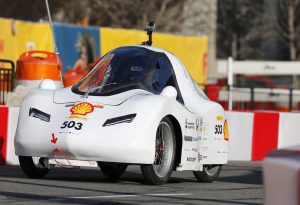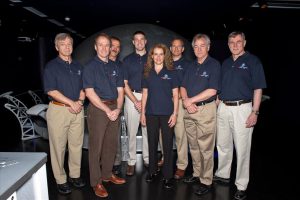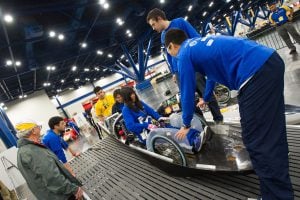The cars of the future may already be here.
From April 22 to 24, more than 1,000 high school and university students from Canada, the United States, Brazil, Ecuador, Guatemala, Mexico and Puerto Rico took to the streets of Detroit, Michigan for the 2016 Shell Eco-marathon. The event challenges students to apply the mathematical and scientific concepts they’ve learned in class to a real-world project: designing, building and road-testing an energy-efficient vehicle.
For the second year in a row, a Canadian team came out on top. The CT 2.0, a prototype car running on gasoline created by Team Université Laval Alérion Supermileage, achieved a fuel efficiency of 1,099 kilometres/litre in the best of six tests to clinch the top spot in its category, while the University of Toronto Supermileage prototype got 1,005 km/l in the best of four tests to take second place.
Canadian teams also came in first place in the battery electric and hydrogen fuel cell prototype categories and the hydrogen-fueled urban concept car category.
We spoke to Pam Rosen, general manager for Shell Eco-marathon Americas, about the program and its role in defining the future of fuel-efficient vehicles.
How does the Shell Eco-marathon work?
Essentially what they’re doing is building either urban concept cars, which are more commercially viable, or building the prototypes for truly ultra-efficient vehicles, and there are a number of different ways they can approach the challenge. The one thing that everyone is striving for is energy efficiency: how are we going to go further on less? All their fuel options are things that have been in the market for years or that automakers are looking to commercialize.
How do they finance this process?
They have to raise all of their own money to build their cars, which gives them additional experience and skills in marketing, fundraising, and business management — all things they can take with them into a future career. We also have a number of partners that help out with parts and expertise.
Isn’t it a bit counterintuitive for an oil and gas company to be encouraging people to design ultra-efficient cars?
While it doesn’t seem to make sense at first, the fact of the matter is it’s what’s best for the world and it’s what is going to move us forward. There are going to be advances in technology, so how do we play a part in that?
Why is the Eco Marathon held in Detroit?
Detroit is the birthplace of automotive, so it’s very special. This is where the very first cars were run, and in fact our street track for the students runs on Woodward Avenue past where Henry Ford had his very first factory. It’s a neat tie to the Marathon’s themes of innovation in technology, because 100 years ago, no one could have ever dreamed of what we’re doing today with these students.
What do you hope students take away from this experience?
We’ve had a number of teachers tell us stories about students who weren’t doing well in math or science but once they got on the Shell Eco Marathon team, something clicked. It wasn’t just numbers or theory on paper, it was actual real world experience, and that made all the difference in helping them understand the fundamentals. We hope first of all that the students have a great experience, but also that they take what they’ve learned and apply it in their future careers.




